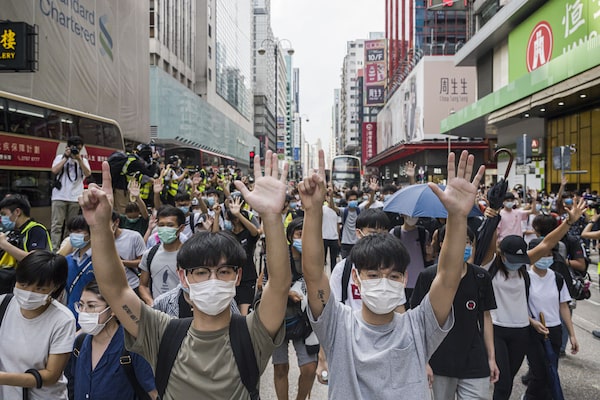Frank Ching is a Hong Kong-based journalist.

Protesters rally against China's national security law, in Hong Kong, on May 27, 2020.Billy H.C. Kwok/Getty Images
Hong Kong, which has prospered for decades as the gateway between China and the West, today serves as a common punching bag for both.
The Standing Committee of the National People’s Congress (NPCSC) is drafting a law to be promulgated in Hong Kong that aims to tackle “secession, subversion of state power, terrorism and acts that endanger national security,” with Beijing’s justifications surrounding a need to “prevent, stop and punish” perpetrators. That law was passed, and the details are now being drafted.
In response, the U.S. State Department told Congress that the imposition of such a law means that Hong Kong is no longer autonomous. President Donald Trump announced Friday that he would wind down preferential policy agreements, including its treatment as a separate customs territory from China. In addition, the U.S. will sanction Hong Kong officials “directly or indirectly involved” in eroding its autonomy.
Ironically, both China and the United States say that they have the best interests of Hong Kong people at heart. Yet Hong Kong has been rendered fearful anyway, by both powers: of China’s potential to restrain its people’s political rights and freedoms, and of the U.S.'s threat to its economic well-being.
Certainly, Hong Kong’s autonomy is being narrowed. The Ministry of Public Security in Beijing has announced that it is ready to “guide” the Hong Kong police force. Similarly, teachers are being recruited across China to “guide” education in Hong Kong, in kindergartens, primary and secondary schools. And pressure is already being put on individuals and companies to fall in line: former Hong Kong chief executive Leung Chun-ying has called on people to close their accounts with HSBC because that bank hasn’t come out in support of the legislation.
But attempts to draft similar legislation for Hong Kong has failed, both before and after the 1997 handover. The fear now is the same as what it was then: that, as is the case in mainland China, it will be used to suppress free expression, silence dissent and to infringe upon human rights and freedoms.
Chief Executive Carrie Lam was asked at a news conference for assurances that the new law would not impact ordinary residents, but just “a tiny number of people.” She responded cryptically: those who worry “will have to wait for the details” of the legislation.
It is odd that the supposed representative of Hong Kong’s 7.5 million people would say nothing about doing her utmost to preserve her people’s rights and freedoms. At the very least, she should say that her administration will do what it can to make the drafting process transparent.
Hong Kong’s 12-member Basic Law Committee – which is appointed by China, with half the members from Hong Kong and half from the mainland – should help the NPCSC to achieve the law’s aims, but no more.
Moreover, those with concerns should not wait for details – they should articulate their worries now, and Chinese authorities should be willing to listen. Anyone with a stake in Hong Kong, including its residents and chambers of commerce, should make their concerns known.
Meanwhile, even though Mr. Trump has announced that the United States will end special treatment of Hong Kong, he has provided no details as to when or how this will happen. But he did leave open the possibility of “exceptions.”
That means China can influence American actions. If the new national-security law is carefully drafted so as to have minimal impact on rights and freedoms, then Washington will have less reason to impose sanctions. This is not a question of Beijing bowing to Western pressure but of doing what is best for all parties, including both mainland China and Hong Kong. If the United States really wants to help the people of Hong Kong, it should refrain as much as possible from taking actions that would hurt Hong Kong more than they hurt China.
The ball is now in China’s court. It is important that, in the coming weeks, Chinese officials involved in the drafting process listen carefully so that, when the bill is promulgated, it will be seen as a law defending national security and nothing more. If China wants to enhance its image in the world through soft power, this represents one of the best opportunities to do so.
Keep your Opinions sharp and informed. Get the Opinion newsletter. Sign up today.